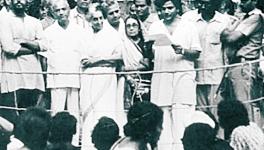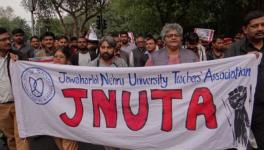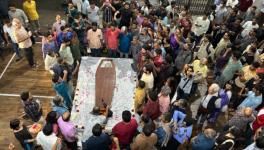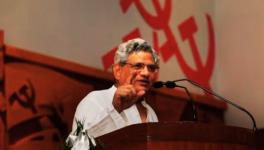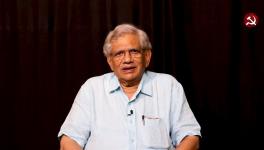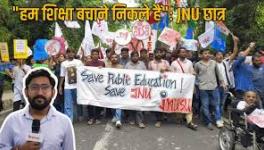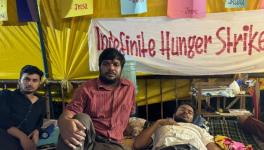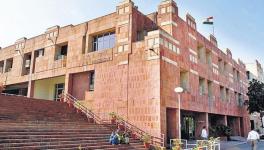2017 JNU Admissions - Over 80% Seat Cut for Researchers

Image Courtesy: Samim Asgor Ali
M.Phil and Ph.D seats in JNU have been drastically cut down by 84%. The seats have been reduced from 1,234 last year to 194 this year. The new prospectus is out and the admission process for the year 2017-18 is on.
The high court has given a verdict upholding the UGC guidelines. The JNUTA brought out a press release after the high court gave the verdict. Even as we respect the judgement of the Hon. Delhi High Court, our view is that the ruling has been given on an issue that was not before the court in the first place – the mandatory/binding nature of UGC Regulations.
They have demanded for an Academic Council meeting to be called. If the UGC Regulations are mandatory “without any deviation”, the JNUTA expects that the JNU administration shall, in service to the oath of fealty to the UGC that it has sworn repeatedly over the past few months, call an Academic Council meeting immediately.
The TA says that Instead of addressing the ill-intentioned deviation from statutory procedure by the JNU administration, the judgement has undermined the JNU Act, and has grave implications for the autonomy of educational institutions. Are university statutory bodies to be reduced to mere rubber stamps and is the observance of due process a mere empty formality? JNUTA does not agree with this as a necessary reading of the UGC’s powers, as the very Regulations under consideration themselves assert the importance of adoption into the statutes of each university.
They added The JNUTA considers the first responsibility of teachers in this scenario is to ensure supervisory arrangements for the nearly 1000 students who took admission in the academic year of 2016 at once. While the JNU administration was forced to agree in Court that the Regulations would not apply to students enrolled in years preceding 2016, the batch of students currently doing M.Phil./PhD coursework or in the first year of Direct PhD is directly affected. It is essential that all students admitted into the M.Phil//PhD and Direct PhD programmes be assigned supervisors first, before the intake for 2017-18 is addressed.
Professor Ayesha Kidwai, the JNUTA President, wrote “total Intake Approved by AC: 1025 + 287 + 94 = 1406 (including Direct PhD seats). Total Intake as per e-prospectus dated 21 March 2017: 194”, “…And this too by a process that is in UTTER violation of their beloved UGC Regulations 2016, which says the number of seats for admission has to be determined by the "academic bodies" of the university. The Centres of JNU were never even shown these figures, let alone consulted. UGC should immediately take action against the JNU VC!”
JNU is primarily a research university. It is an institute of higher learning which is known to encourage critical thinking and research. 62% of its current strength is that of students pursuing MPhil and PhD programmes. It is interesting to note that the average of the students enrolled for MPhil and PhD in the 42 Central Universities is a mere 3.5%.
In the beginning of February, the JNUSU had gone on an indefinite strike against the same UGC gazette. The students had raised their voices against it.
The students had foreseen the seat cuts. They had made the following point. The UGC notification lays down strict rules regarding the eligibility of “research supervision”. It says: “A Research Supervisor/Co-supervisor who is a Professor, at any given point of time, cannot guide more than three (3) M.Phil. and Eight (8) Ph.D. scholars. An Associate Professor as Research Supervisor can guide up to a maximum of two (2) M.Phil. and six (6) Ph.D. scholars and an Assistant Professor as Research Supervisor can guide up to a maximum of one (1) M.Phil. and four (4) Ph.D. scholars.” This implies cutting seats for M.Phil./Ph.D. admissions.
With the new prospectus, there would be no admissions for research this year in centres like Centre for Sociology, Centre for Pol. Science, Centre for History, Centre for Indian Languages and many more. The seats have been slashed in many other important centres as well. JNU’s oldest School, School of International Studies, will offer MPhil/PhD seats in only 3 out of 13 centres.
Three schools –School of physical sciences, School of computational and School of integrative sciences, and biotechnology – and two special Centres – Centre for law and governance and Special Centre for Sanskrit studies – have no seats for the integrated MPhil-PhD programme.
The students called for a university strike against the seat cuts today.
Get the latest reports & analysis with people's perspective on Protests, movements & deep analytical videos, discussions of the current affairs in your Telegram app. Subscribe to NewsClick's Telegram channel & get Real-Time updates on stories, as they get published on our website.









